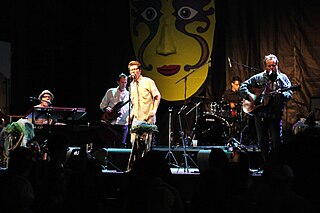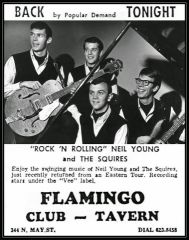
Neil Percival Young is a Canadian and American singer-songwriter. After embarking on a music career in Winnipeg in the 1960s, Young moved to Los Angeles, joining the folk-rock group Buffalo Springfield. Since the beginning of his solo career, often with backing by the band Crazy Horse, he has released critically acclaimed albums such as Everybody Knows This Is Nowhere (1969), After the Gold Rush (1970), Harvest (1972), On the Beach (1974), and Rust Never Sleeps (1979). He was also a part-time member of Crosby, Stills, Nash & Young, with whom he recorded the chart-topping 1970 album Déjà Vu.
Country rock is a music genre that fuses rock and country. It was developed by rock musicians who began to record country-flavored records in the late 1960s and early 1970s. These musicians recorded rock records using country themes, vocal styles, and additional instrumentation, most characteristically pedal steel guitars. Country rock began with artists like Buffalo Springfield, Michael Nesmith, Bob Dylan, Nitty Gritty Dirt Band, the Byrds, the Flying Burrito Brothers, The International Submarine Band and others, reaching its greatest popularity in the 1970s with artists such as Emmylou Harris, the Eagles, New Riders of the Purple Sage, Linda Ronstadt, Little Feat, Poco, Charlie Daniels Band, and Pure Prairie League. Country rock also influenced artists in other genres, including The Band, the Grateful Dead, Creedence Clearwater Revival, The Rolling Stones, and George Harrison's solo work, as well as playing a part in the development of Southern rock.

Buffalo Springfield was a rock band formed in Los Angeles by Canadian musicians Neil Young, Bruce Palmer and Dewey Martin and American musicians Stephen Stills and Richie Furay. The group, widely known for the song "For What It's Worth", released three albums and several singles from 1966 to 1968. Their music combined elements of folk music and country music with influences from the British Invasion and psychedelic rock. Like contemporary band the Byrds, they were key to the early development of folk rock. The band took their name from a steamroller parked outside their house.

The Guess Who is a Canadian rock band formed in Winnipeg, Manitoba in 1965. The band found their greatest success in the late 1960s and early 1970s, under the leadership of singer/keyboardist Burton Cummings and guitarist Randy Bachman, with hit songs including "American Woman", "These Eyes", and "No Time".

Burton Lorne Cummings is a Canadian musician. He is best known for leading The Guess Who during that band's most successful period from 1965 to 1975, and for a lengthy solo career.
Manitoba has produced much Canadian music, especially since the early 1960s.

Skydiggers is a Canadian roots rock band from Toronto formed by Andy Maize and Josh Finlayson. Since 1990, they have released 19 albums/EPs and have had a number of singles that have appeared on the Canadian charts. Their most successful album is Restless, released in 1992. With a presence spanning decades, the band has appeared under a variety of different record labels and with many changes in members that form the group.

Yesshows is the second live album by the English progressive rock band Yes. It was released in November 1980 on Atlantic Records as the final album before the group disbanded in early 1981. Their first live album in seven years, it is compiled of recordings from their 1976, 1977, and 1978 tours from dates in North America and Europe with its mixing supervised by bassist Chris Squire.

This Note's for You is the 18th studio album by Canadian-American musician Neil Young, released April 11, 1988, on Reprise. The album marked Young's return to the recently reactivated Reprise Records after a rocky tenure with Geffen Records.

Kurt Frank Winter was a Canadian guitarist and songwriter, best known as the lead guitarist for The Guess Who from 1970 to 1974.

Time on Earth is the fifth studio album by Australian rock band Crowded House. Tracks have been produced by both Ethan Johns and Steve Lillywhite and the album was released on 30 June 2007 in Australia, 2 July in the United Kingdom and 10 July in North America. Time on Earth is the band's first studio album since 1993, and marks the reunion of the band eleven years after they disbanded and features new drummer Matt Sherrod in place of the original drummer, Paul Hester, who died in 2005.

Neil Young Archives Vol. 1: 1963–1972 is the first in a planned series of box sets of archival material by Canadian-American musician Neil Young. It was released on June 2, 2009, in three different formats - a set of 10 Blu-ray discs in order to present high-resolution audio as well as accompanying visual documentation, a set of 10 DVDs, and a more basic 8-CD set. Covering Young's early years with The Squires and Buffalo Springfield, it also includes various demos, outtakes and alternate versions of songs from his albums Neil Young, Everybody Knows This Is Nowhere, After the Gold Rush, and Harvest, as well as tracks he recorded with Crazy Horse and Crosby, Stills, Nash & Young during this time. Also included in the set are several live discs, as well as a copy of the long out-of-print film Journey Through the Past, directed by Young in the early 1970s.
Allan Peter Stanley Kowbel, better known by his stage name Chad Allan, was a Canadian musician. He was the founding member and original lead singer of The Guess Who.

"Sugar Mountain" is a song by Canadian folk rock singer and composer Neil Young. Young composed the song on November 12, 1964—his 19th birthday—at the Victoria Hotel in Fort William, Ontario, where he had been touring with his Winnipeg band the Squires. Its lyrics are reminiscences about his youth in Winnipeg, Manitoba.

Manitoban culture is a term that encompasses the artistic elements that are representative of Manitoba. Manitoba's culture has been influenced by both traditional and modern Canadian artistic values, as well as some aspects of the cultures of immigrant populations and its American neighbours. In Manitoba, the Minister of Culture, Heritage, Tourism and Sport is the cabinet minister responsible for promoting and, to some extent, financing Manitoba culture. The Manitoba Arts Council is the agency that has been established to provide the processes for arts funding. The Canadian federal government also plays a role by instituting programs and laws regarding culture nationwide. Most of Manitoba's cultural activities take place in its capital and largest city, Winnipeg.
The Enthusiasts are a Canadian garage rock band from Winnipeg, Manitoba, active from 1963 to 1972. Considered one of the most influential underground Canadian rock groups of the 20th century, the band's style paved the way for the first waves of Canadian punk rock and art rock. The Enthusiasts are considered pioneers of indie rock as well. While the band saw little mainstream success outside of their native Canada, their influence on later music scenes would be tremendous, especially during the 1980s. The band has been disbanded since early 1972, although they briefly united for a short Canadian tour in 1984. Currently there are no plans for any further Enthusiasts reunions.

Gregory Leskiw is a Canadian guitarist best known for playing guitar with the Guess Who from 1970 to 1972.

Ian L. Gardiner is a bass player. He has played with Burton Cummings, formerly of the Guess Who, Lenny Breau, Makanda Ken McIntyre, Randy Bachman and many other musicians. He's produced Bo Diddley, The Bonedaddys and The Delphines; engineered Supertramp and The Knack, and more. Since 1996, he designs and manufactures custom pro audio gear and recording consoles, as the founder of Boutique Audio & Design and co-founder of Tree Audio, located in Los Angeles, California.
Spice, originally Sugar & Spice, was a Canadian pop and folk band based in Winnipeg, Manitoba, active from 1967 to 1973.

"Nowadays Clancy Can't Even Sing" is a song by the Canadian-American folk rock band Buffalo Springfield, released as the group's debut single in August 1966. Neil Young wrote the song in Yorkville in 1965 shortly after returning from a series of performances in Toronto, during a period when his bid at a solo career had been met with little positive response. The lyrics reflect metaphorically on Young's frustration toward his stalled career in music, and was inspired by Ross "Clancy" Smith, an aberrant classmate who incited awe in his school. Commentators recognize "Nowadays Clancy Can't Even Sing" as one of Buffalo Springfield's signature songs, as well as a milestone in Young's progression as a songwriter.















